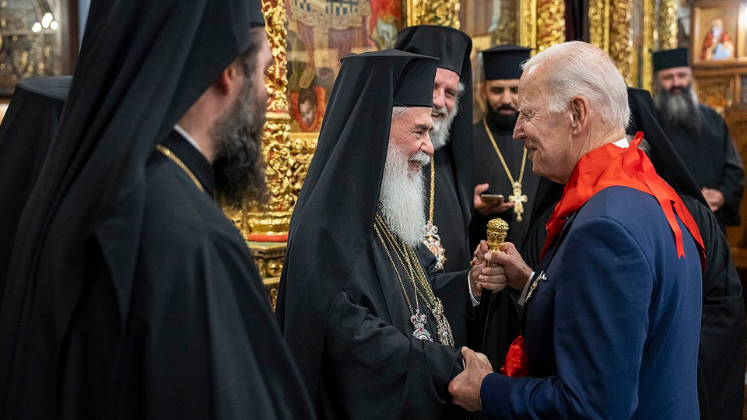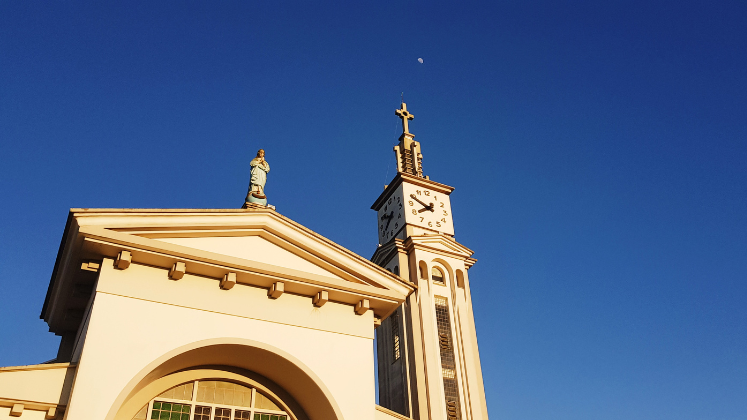With a wealth of international collaboration, who can lead on religious freedom advocacy, and what is the Organization of American States (OAS) doing to protect the right to Freedom of Religion or Belief? In this article, Emily A. Cole outlines the importance of the right to express oneself, to think freely, to openly share one’s cultural identity or faith.

“El hombre es el ser maravilloso de la Naturaleza. Torturarlo, destrozarlo, exterminarlo por sus ideas debe ser, más que una violación de los Derechos Humanos, un crimen contra toda la humanidad.”
“Man is the marvelous being of Nature. To torture him, to destroy him, to exterminate him for his ideas must be, more than a violation of human rights, a crime against all humanity.”
– Armando F. Valladares, a former Cuban dissident
Overview
The Organization of American States (OAS) has been a human rights leader since its inception in 1948. Centred on human rights, 2023 marks the 75th anniversary of the foundational document of the Inter-American System—the American Declaration of the Rights and Duties of Man—a landmark predating the UN Universal Declaration of Human Rights by several months. While a host of human rights are under pressure across the Americas and the Caribbean, religious freedom is generally respected and protected. This provides an opportunity for the OAS and its member states to lead.
With 34 member states, and after three-quarters of a century, the OAS remains a leading forum engaging the Western Hemisphere in democracy, human rights protection, security, development, and sustainability. Its ability to generate collaboration between countries of varying backgrounds, goals, and economic situations is significant. The cultural differences, expressions, and ways of life in each member state alone make the contributions and history of the OAS distinct.
The right to believe—or not believe—and to express that belief peacefully is a foundational right in the Americas. Article III of the American Declaration states, “Every person has the right freely to profess a religious faith, and to manifest and practice it both in public and in private.” Since its inception, the OAS has recognised the inherent dignity of each individual to have freedom of conscience, respecting mind and body with freedom of religion or belief (FoRB). While the Inter-American Court for Human Rights has rarely considered religious freedom cases, FoRB has two components under international law: (1) the freedom to have, not have, or to adopt a religion or belief of one’s choice, including the right to change that religion or belief, and (2) the freedom to manifest one’s religion or belief, individually or in community with others, in public or private, through worship, observance, practice and teaching.
The OAS has the opportunity, through its individual organs, procedures, and member state cooperation, to lead on religious freedom advocacy. While other areas of the world continue to experience extreme violence and religious persecution, the OAS region provides a positive example. That’s not to say everything is perfect. Rising attacks against Catholic institutions in Nicaragua and the continuous restrictive measures on religious freedom in Cuba are the worst examples. But more broadly, the high levels of gender-based violence throughout the region as well as attacks on minority rights and the shrinking of civic space (particularly in Central America) for indigenous faiths, reveals an unprecedented moment for this regional body to act.
While Cuba and Nicaragua provide two current examples of religious repression under authoritarian regimes, other OAS member states can likely think of their own struggles to promote religious pluralism amid diverse traditions and rich cultural histories. And it is also likely other member states would agree that repression of religious freedom can and has contributed to the rise of other human rights violations throughout the 21st Century.
Minority and Indigenous Communities
The June 2023 USCIRF report “Religious Freedom for Indigenous Communities in Latin America” noted continued discrimination in public institutions against Indigenous peoples, as well as recorded violent attacks. The Inter-American Commission has been positive in its defense of these communities and their collective religious freedom, but there remains a gap between those protections and the protection of individual Indigenous peoples.
Land rights also remain a particular area of concern, as sacred space and sites within many communities are not recognised in the same way religious buildings might be in other parts of the world. And still, other areas of concern, such as the right to education, information, and communication as well as environmental protections continue at the forefront of religious freedom discussions within these communities. Religious expression, for many of these Indigenous groups, is often intrinsically tied to their land, culture, and way of life.
Moreover, documented cases of discrimination and even killings of Indigenous leaders continue, most notably in Mexico, Ecuador, Brazil, and Colombia, in addition to gender-based violence against Indigenous women and girls due to social norms which tend to normalise violence toward women. Additionally, reports indicate that in 2022, Latin America had the most attacks on environmental defenders, with Indigenous peoples being the greatest affected by such violence.
Imagine if sacred sites were respected for their religious and cultural significance? A collective, regional shift in perspective under FoRB promotion could better protect environmental defenders and the communities occupying the lands.
Of course, it is not only Indigenous peoples that suffer due to their minority status; Afro-descendants in many areas endure similar discrimination and violations on account of their ethnic and religious identities.
A Pivotal Crossroads
Because FoRB is multi-dimensional, the OAS should continue to hold forums and/or panels composed of various religious leaders across member states, comprising of diverse perspectives and backgrounds on a variety of topics and social issues. Since religious leaders often represent their community at large, it would provide meaningful discourse from a more localised level. For example, the September 29, 2023 event hosted by the OAS on freedom of conscience, pluralism, and FoRB in the Americas was fruitful with many Permanent Missions and high level officials represented. This same kind of event or discussion could take place in member states’ own communities, with some more localised and others more top-down as was the September event. All, of course, supported and approved by the OAS and its many organs.
Indeed, the OAS can continue to lead by holding these intentional discussions, urging its member states to protect religious expression as a cornerstone to the human rights system. Without it, other rights—like freedom of expression, cultural rights, and even education—are placed at greater risk. Now is the time for civil society organisations and government officials in the hemisphere to urge the OAS, and particularly its Permanent Council, to embrace this important leadership role.
Marginalised communities—including those of faith—are also vital advocates against violence and insecurity not only because faith (or none) and the ability to change one’s faith are integral parts of humanity and living in pluralism, but also because FoRB undeniably intersects with the other fundamental rights noted above, possessing the ability, then, to create positive ripple effects in other areas of society. Further, moral convictions, which impact political and social frameworks, are more often than not informed by one’s religion, or lack thereof. As a result, FoRB advocacy is uniquely situated to go the extra step to protect and uplift minorities, sacred space, and cultural expression, not only promoting but also appreciating diverse ideologies and political expressions. It promotes civic space. Advancing pluralistic societies among member states is therefore imperative to the greater stability of the region, and the OAS, established to “promote solidarity” and “strengthen collaboration,” should emphasize such pluralism this coming year.
In Latin America and the Caribbean (LAC), safeguarding the human rights of citizens remains a multifaceted challenge: immigration crises affecting the economies in multiple member states across the region, including Mexico, Peru, and Argentina; humanitarian crises in Venezuela and Cuba; crime surges (often linked to narcotics trafficking) in Ecuador, El Salvador, and Chile (a recent shift from Central America to South America and the Caribbean); gang violence—which disproportionately affects women and girls—on the rise in Haiti, Honduras, and Colombia; increase in illicit arms trafficking across the hemisphere; and continued conflict-related sexual violence. Some member states are also balancing China’s growing influence in the region: China has become a top trading partner and source of foreign investment in LAC, with seemingly genuine motivations on the part of some member states to expand markets and influence but at the expense of certain international communities arguing said ties will only reinforce authoritarian regimes (like in Venezuela, Cuba, and Nicaragua) and could potentially garner unwanted financial repercussions from the United States.
Nevertheless, with the recent celebration of the 75th Anniversary of the Universal Declaration of Human Rights and adoption of the OAS Charter (December 10th) together with the recent celebration of International Religious Freedom Day (October 27th) and the forthcoming report by the IACHR on “the right to freedom of conscience and religion or belief,” there is no better time for the OAS to strengthen its voice as a committed advocate for religious freedom. FoRB should be a focal point for the OAS’s 2024 year ahead.
The recent release of an advocacy letter by the International Panel of Parliamentarians for Freedom of Religion or Belief (IPPFoRB) at the 2023 IRFBA Ministerial Conference in Prague provides a positive example of FoRB in focus in Latin America. The letter called on President Daniel Ortega’s government to recognise its FoRB violations, adhere to international human rights standards, and for the unconditional release of Bishop Rolando Álvarez, among others arbitrarily detained. In October, a similar letter was released to the Cuban government. Advocacy letters like these should be a priority among civil society organisations in the region during 2024, and OAS member states should likewise encourage such efforts.
Also of importance was the Permanent Council’s recent response to Nicaragua’s withdrawal from the multilateral body. With the withdrawal officially completed on November 19, 2023, the Permanent Council and numerous member states have emphatically declared that the departure does not in any way exempt the Nicaraguan government from adhering to international human rights standards, and that the international community, including the OAS, will continue monitoring its actions closely. Such leadership is invaluable.
Why is this Important?
The right to express oneself, to think freely, to openly share one’s cultural identity or faith is imperative to the human experience. Armando Valladares, whose quote began the article, understood this from his time as a political prisoner who spent twenty-two years in Castro’s gulag. Man’s ability to believe (or not believe) and to express that belief peacefully is the foundation to so many other important rights. The inherent dignity of each individual requires respect of mind and body. Indeed, it is through the flourishing of ideas—and often unwavering belief or faith—that a society, a region, a hemisphere, prevails.





